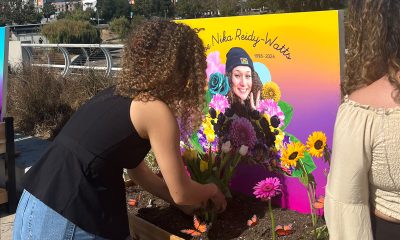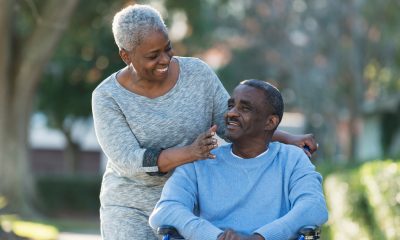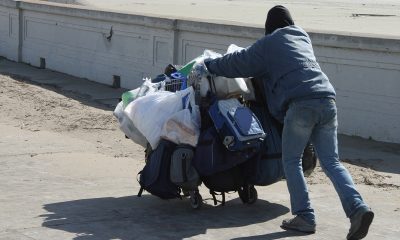Health
Exercising Critically Ill Patients May Help Speed Recovery

In this photo provided by the Wake Forest Baptist Medical Center, taken March 11, 2015 in the intensive care unit at Wake Forest Baptist Medical Center, physical therapist Katie Kellner helps patient Terry Culler do some exercises and briefly stand despite being hooked to a ventilator. There’s increasing evidence that mild exercise may have its place even for the sickest ICU patients, and new animal research suggests it may target both muscles and lungs. (AP Photo/Warren Cameron Dennis III, Wake Forest Baptist Medical Center)
LAURAN NEERGAARD, AP Medical Writer
WASHINGTON (AP) — The intensive care unit is a last frontier for physical therapy: It’s hard to exercise patients hooked to ventilators.
Some hospitals do manage to help critically ill patients stand or walk even if they’re tethered to life support. Now research that put sick mice on tiny treadmills shows why even a little activity may help speed recovery.
“I think we can do a better job of implementing early mobility therapies,” said Dr. D. Clark Files of Wake Forest Baptist Medical Center in Winston-Salem, North Carolina, who led the research and whose hospital is trying to get more critically ill patients up, ventilator and all.
Hospitals have long nudged less critical patients out of bed, to prevent their muscles from wasting away. But over the past several years, studies in ICUs have shown that some of the sickest of the sick also could benefit — getting out of intensive care sooner, with fewer complications — once it’s medically feasible for them to try.
This isn’t just passively changing a patient’s position. It could involve helping them sit on the side of the bed, do arm exercises with an elastic band or in-bed cycling, even walk a bit with nurses holding all the tubes and wires. It takes extra staff, and especially for patients breathing through tubes down their throats, it isn’t clear how often it’s attempted outside specialized centers.
At Wake Forest Baptist, a physical therapist helped Terry Culler, 54, do arm and leg exercises without dislodging his ventilator tubing, working up to the day he stood for the first time since developing respiratory failure about three weeks earlier. “I cheered, I was clapping,” his wife, Ruanne Culler of Lexington, North Carolina, said after two therapists and a nurse finally helped him to his feet.
Biologically, why could such mild activity help? Files focused on one especially deadly reason why people wind up on a ventilator: acute respiratory distress syndrome, or ARDS, the problem Terry Culler battled. It strikes about 200,000 Americans a year, usually after someone suffers serious injuries or another illness such as pneumonia; it can rapidly trigger respiratory failure. Survivors suffer profound muscle weakness.
Files’ team injured the lungs of laboratory mice in a way that triggered ARDS. The animals, sick but still breathing on their own, walked or ran on a treadmill for a few minutes at a time over two days.
That short amount of exercise did more than counter wasting of the animals’ limbs. It also slowed weakening of the diaphragm, used to breathe. And it tamped down a dangerous inflammatory process in the lungs that Files suspects fuels muscle damage on top of the wasting of enforced bed-rest.
“It’s not only putting a load on the legs,” Files explained. “It’s something systemic.”
When certain white blood cells stick inside ARDS-affected lungs too long, they slow healing. The lungs of the exercised mice contained fewer of those cells — and their blood contained less of the protein that activates them, Files reported in the journal Science Translational Medicine this month.
Examining blood frozen from ARDS patients who had participated in an earlier Wake Forest Baptist study comparing early mobility to standard ICU care, he found patients who had gotten a little exercise harbored less of that protein.
The new research adds to the biologic rationale, but there’s already enough evidence supporting early mobility that families should ask whether their loved one is a candidate, said ICU specialist Dr. Catherine Hough of the University of Washington, who wasn’t involved with Files’ study.
She’s surveying a sample of U.S. hospitals and finding variability in how often ICUs try, from those that help a majority of critically ill patients stand to others where no ventilated patients do. Obviously, key is whether the patient can tolerate movement. But so is whether hospitals keep ventilated patients sedated despite research showing many don’t need to be, Hough said.
Back at Wake Forest Baptist, Terry Culler began the exercises when he was medically stable, and he scribbled notes saying he wanted to participate.
“It’s given him something to look forward to,” his wife said a few weeks before he was released from the hospital.
“Ask about it every day,” University of Washington’s Hough advises families, given that critical illness changes frequently. “On Monday, the patient might have a good reason not to be moving forward with mobilization, but there’s a very good chance it’s different on Tuesday,” she said.
Copyright 2015 The Associated Press. All rights reserved. This material may not be published, broadcast, rewritten or redistributed.
Activism
NAACP California-Hawaii State Convention Highlights Black Voter Engagement, and More
A Friday panel featuring NAACP Chairman Leon W. Russell and Regina Wilson, Executive Director of California Black Media, examined Project 2025, an initiative perceived as a potential threat to civil rights, healthcare access, and environmental protection. This session emphasized Project 2025’s projected impact on Black communities, noting that policies within the initiative could diminish gains in civil and environmental rights over decades. Russell and Wilson highlighted the need for vigilant monitoring and community mobilization to address these challenges.

By Bo Tefu, California Black Media
The 37th NAACP California-Hawaii State Convention concluded on Sunday, Oct 27, following four days of discussions and workshops at the Los Angeles Airport Marriott. Bringing together civil rights leaders, policymakers, and advocates from California and Hawaii, the convention operated under the theme “All In.” The participants discussed critical issues impacting Black communities, including criminal justice reform, health equity, economic empowerment, education, environmental justice, and voting rights.
A Friday panel featuring NAACP Chairman Leon W. Russell and Regina Wilson, Executive Director of California Black Media, examined Project 2025, an initiative perceived as a potential threat to civil rights, healthcare access, and environmental protection. This session emphasized Project 2025’s projected impact on Black communities, noting that policies within the initiative could diminish gains in civil and environmental rights over decades. Russell and Wilson highlighted the need for vigilant monitoring and community mobilization to address these challenges.
On Saturday, the President’s Fireside Chat brought together NAACP President Derrick Johnson and CA/HI State Conference President Rick Callender, who discussed the urgency of voter engagement and community advocacy.
Guest speakers included Congresswoman Maxine Waters (D-CA-43), who spoke at the Women in NAACP (WIN) Labor Luncheon about the intersection of labor rights and civil rights. California State Superintendent Tony Thurmond delivered remarks at the Leadership Dinner on education equity, focusing on policies to ensure all students have access to high-quality education.
Honors were given to longtime social justice advocate and former Assemblymember Mike Davis for his work in community activism. At the same time, actor and activist Danny Glover and the Rev. Dr. Amos C. Brown received the 2024 Legacy Hall of Fame Awards, recognizing their lifelong commitments to advancing civil rights.
The convention also offered practical workshops, including “What’s On Your Ballot?,” where coalition leaders provided analyses of California propositions, explaining their potential impacts on community rights and resources. The Voter Turnout Workshop provided background and encouraged participants to promote voter turnout through community-centered outreach strategies.
Sunday’s events closed with a Prayer and Memorial Breakfast honoring the contributions of past and current civil rights leaders.
Activism
Atty Gen Bonta: U.S. Law Mandating Emergency Care to All Patients Faces Threats
The attorney general highlighted that EMTALA is vital for ensuring that no individual is turned away from emergency services based on financial status or insurance coverage. Bonta stated that the law has been a cornerstone of emergency healthcare for decades, providing peace of mind to millions of Americans who might otherwise hesitate to seek urgent medical attention due to cost concerns.

By Bo Tefu, California Black Media
California Attorney General Rob Bonta emphasized the critical need to protect the Emergency Medical Treatment and Labor Act (EMTALA), mandating that hospitals provide emergency care to all patients regardless of their ability to pay.
In a recent statement, Bonta highlighted the potential threats to this essential legislation amid ongoing discussions about healthcare accessibility in the U.S.
“EMTALA ensures that no one is denied access to emergency medical care, including abortion care, and this federal law is more imperative than ever following the overturn of Roe v. Wade,” said Bonta.
The attorney general highlighted that EMTALA is vital for ensuring that no individual is turned away from emergency services based on financial status or insurance coverage. Bonta stated that the law has been a cornerstone of emergency healthcare for decades, providing peace of mind to millions of Americans who might otherwise hesitate to seek urgent medical attention due to cost concerns.
This decision to support the federal government’s case comes at a time when many healthcare providers are facing pressure from rising costs and legislative changes that could undermine existing protections. Bonta called on lawmakers to reinforce EMTALA’s provisions and to combat any efforts aimed at weakening the act, asserting that equitable access to emergency care is a fundamental right.
He urged state and federal governments to ensure that all Americans, particularly marginalized communities, have the necessary access to emergency services without fear of financial repercussions. The brief indicates the coalition’s commitment to healthcare equity, emphasizing that maintaining strong protections under EMTALA is crucial for safeguarding public health.
As discussions around healthcare policy continue, Bonta remains steadfast in promoting initiatives that protect emergency care access, asserting that everyone deserves timely and appropriate medical treatment in emergencies. His efforts align with ongoing legal and advocacy battles to preserve the rights established by EMTALA in the face of evolving healthcare challenges.
Alameda County
Access Better Health with Medically Tailored Meals – Transforming Health Through Nutrition for Medi-Cal Patients
Launched in 2018, the Medically Tailored Meals pilot program was designed to help Medi-Cal patients with congestive heart failure by reducing hospital readmissions and emergency department visits by providing tailored meals meeting specific dietary needs. The program’s success in improving health outcomes and reducing costly emergency room visits encouraged the Department of Health Care Services (DHCS) to expand the Medically Tailored Meals program to all 58 counties through Medi-Cal transformation and a new set of services called Community Supports.

Advertorial
Launched in 2018, the Medically Tailored Meals pilot program was designed to help Medi-Cal patients with congestive heart failure by reducing hospital readmissions and emergency department visits by providing tailored meals meeting specific dietary needs.
The program’s success in improving health outcomes and reducing costly emergency room visits encouraged the Department of Health Care Services (DHCS) to expand the Medically Tailored Meals program to all 58 counties through Medi-Cal transformation and a new set of services called Community Supports.
Medically Tailored Meals are one of 14 new services offered through Medi-Cal that provide members with access to new and improved services to get well-rounded care that goes beyond the doctor’s office or hospital.
Medically Tailored Meals: Overview
Malnutrition and poor nutrition can lead to severe health outcomes, especially among Medi-Cal patients with chronic health conditions. Medically Tailored Meals aim to improve health outcomes, reduce hospital readmissions, and enhance patient satisfaction by providing essential nutrition.
Key Features:
- Post-Discharge Delivery: Meals are delivered to patients’ homes immediately following discharge from a hospital or nursing home.
- Customized Nutrition: Meals are tailored to meet the dietary needs of those with chronic diseases, designed by registered dietitians (RD) or certified nutrition professionals based on evidence-based guidelines.
- Comprehensive Services: Includes medically tailored groceries, healthy food vouchers, and food pharmacies.
- Educational Support: Behavioral, cooking, and nutrition education is included when paired with direct food assistance.
Key Benefits:
- Address Food Insecurity: Mitigates poor health outcomes linked to food insecurity.
- Support Complex Care Needs: Tailored to individuals with chronic conditions.
- Improve Health Outcomes: Studies show improvements in diabetes control, fall prevention, and medication adherence.
Patient Testimonial:
“My diabetes has gotten better with the meals. I’ve kept my weight down, and I feel much better now than I have in a long time. I’m one of the people this program is meant for.” — Brett
Eligibility:
- Eligible Populations: Eligible Medi-Cal members include those with chronic conditions like diabetes, cardiovascular disorders, congestive heart failure, stroke, chronic lung disorders, HIV, cancer, gestational diabetes, and chronic mental or behavioral health disorders. Also, those being discharged from a hospital or skilled nursing facility or at high risk of hospitalization or nursing facility placement are also eligible.
- Service Limitations: Up to two meals per day for up to 12 weeks, extendable if medically necessary. Meals eligible for reimbursement by alternate programs are not covered.
Cost Savings and Improved Health Outcomes:
- Health Outcomes: Research indicates a 22% to 58% decrease in emergency department visits and a 27% to 63% decrease in inpatient admissions among Medically Tailored Meals recipients, translating to significant health care cost savings.
Project Open Hand: A Success Story
Project Open Hand has been a leader in providing Medically Tailored Meals, significantly impacting the lives of Bay Area Medi-Cal patients with chronic illnesses. Since its inception, Project Open Hand has delivered nutritious meals to individuals with diabetes, HIV, and other serious health conditions, demonstrating remarkable health improvements and cost savings.
Key Achievements:
- Improved Health Outcomes: Project Open Hand’s research found a 50% increase in medication adherence among recipients of Medically Tailored Meals.
- Reduced Hospitalizations: Their program showed a 63% reduction in hospitalizations for patients with diabetes and HIV.
- Enhanced Quality of Life: Patients reported better health and increased energy levels.
Project Open Hand ensures that each meal is prepared using fresh, wholesome ingredients tailored to meet the specific dietary needs of its clients. By partnering with Medi-Cal managed care plans, Project Open Hand continues to provide life-saving nutrition to those who need it most.
Join Us in Our Mission
You can experience the profound impact of Medically Tailored Meals by joining the Medi-Cal Community Supports services initiative. Your involvement can make a difference in promoting your health through nutrition.
Learn More
For more information about Medically Tailored Meals and how to get involved, call the state’s Medi-Cal Health Care options at 800-430-4263 or contact your local managed care plan.
In Alameda County, Medi-Cal recipients can contact:
* Alameda Alliance for Health: 510-747-4567
* Kaiser Permanente: 855-839-7613
In Contra Costa County, Medi-Cal recipients can contact:
* Contra Costa Health Plan: 877-661-6230
* Kaiser Permanente: 855-839-7613
In Marin County, Medi-Cal recipients can contact:
* Partnership Health Plan of California: 800-863-4155
* Kaiser Permanente: 855-839-7613
In Solano County, Medi-Cal recipients can contact:
* Partnership Health Plan of California: 800-863-4155
* Kaiser Permanente: 855-839-7613
Your health and well-being are your health care provider’s top priority. Medically Tailored Meals are designed to enhance quality of life by advancing health care through the power of nutrition. Experience the benefits today, and take the first step toward a healthier you.
-

 Alameda County1 week ago
Alameda County1 week agoAlameda County District Attorney Pamela Price Announces $7.5 Million Settlement Agreement with Walmart
-
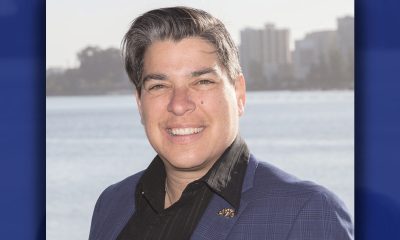
 Activism2 weeks ago
Activism2 weeks agoOP-ED: Hydrogen’s Promise a Path to Cleaner Air and Jobs for Oakland
-
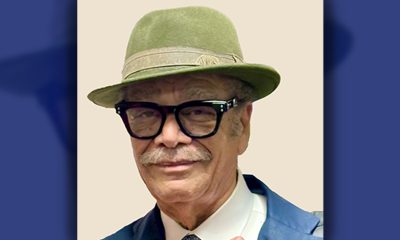
 Activism3 weeks ago
Activism3 weeks agoCOMMENTARY: DA Price Has Done Nothing Wrong; Oppose Her Recall
-

 Activism3 weeks ago
Activism3 weeks agoBarbara Lee, Other Leaders, Urge Voters to Say ‘No’ to Recalls of D.A. Pamela Price, Mayor Sheng Thao
-
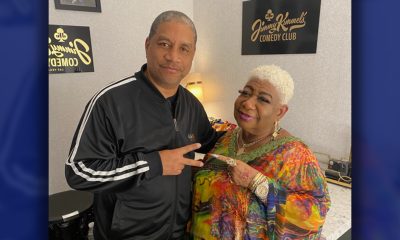
 Community2 weeks ago
Community2 weeks agoTerry T. Backs Oakland Comedy Residency by Oakland’s Luenell at Jimmy Kimmel’s Comedy Club in Las Vegas
-

 Bay Area3 weeks ago
Bay Area3 weeks ago2024 Local Elections: Q&A for Oakland Unified School Candidates, District 3
-

 Activism3 weeks ago
Activism3 weeks agoOakland Post: Week of October 9 – 15, 2024
-

 Business2 weeks ago
Business2 weeks agoStudy Confirms California’s $20/Hour Fast Food Wage Raises Pay Without Job Losses



